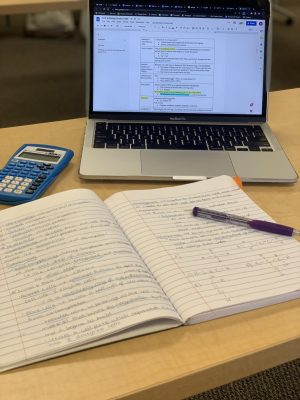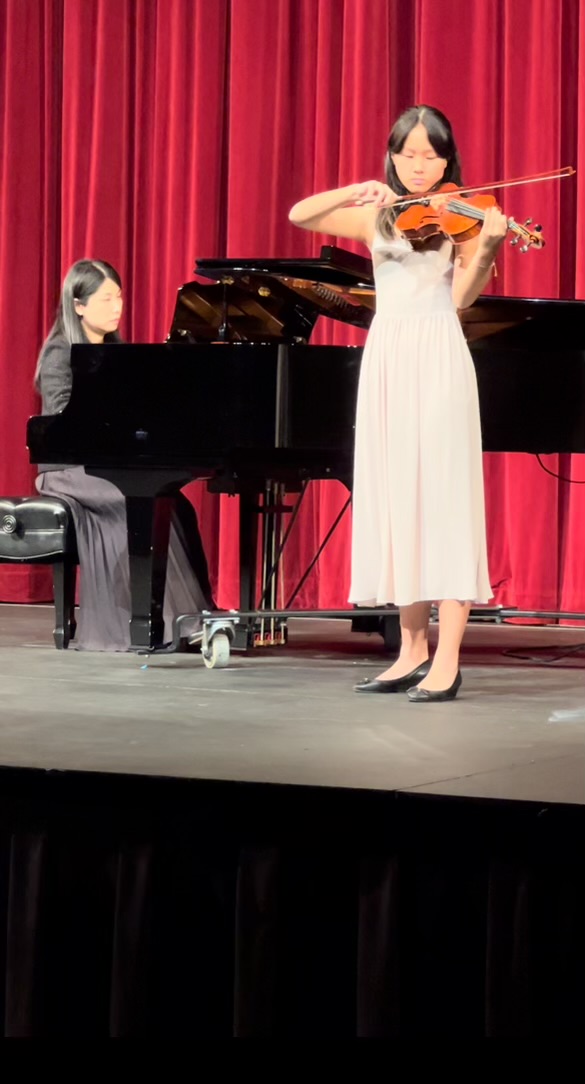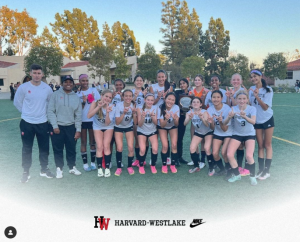Recent surveys sent to Harvard-Westlake (HW) students suggest that it is possible HW parents have paid doctors for a diagnosis that permits students without learning differences extra time on exams, despite HW’s growing attempts to accommodate students with learning differences and reduce stigmas surrounding them.
Two anonymous HW students claimed in a survey that their parents paid for a diagnosis that would give them extra time on assessments. “My parents did pay quite the doctor quite a bit of money for a favorable diagnosis,” one student said. Another stated that, “My parents paid money so I could get it but now I don’t want it.” Both students noted that they use their extra time “somewhat frequently.”
An anonymous HW parent confirmed the possibility of this trend, saying that parents are aware of how to falsely obtain extra time. Rachel* was told by a friend that she could get extra time for her child who does not have a learning disability.
“It was a friend who was saying, well maybe you should get it because if everyone has it, your children are going to be severely disadvantaged. And I could see why people are saying that. Not just about me, but just that my kid is, their peer group, if most of the peer group has a time advantage and my kid doesn’t, and, cause it affects the curve,” Rachel said.
Rachel added that the pressure of college admissions is often on parents’ minds, and especially after the recent college scandal, getting extra time for their children became a topic of conversation for parents.
“It was more of a, gosh, can you believe what’s going on, do you know these people, do you know that extra time is rampant … All that was said to me is that it’s really easy. That it’s like five thousand dollars, you can go get a note,” she said.
Rachel expressed concern that her child and their peers would be harmed by other students cheating. “My child has come home saying ‘I don’t think I did well on the test cause I didn’t finish.’ So, I’m thinking, ‘my kid needs extra time.’ So, if there are kids who are similar to my child, and they’re getting extra time, and they’re finishing their test, they’re driving that curve up. It dilutes the meaning of the scores.”
According to statistics provided by Upper School learning specialist Grace Brown in a HW Chronicle Op-Ed “approximately ten percent of the U.S. population has a neurologically diverse attribute that negatively affects learning in a traditional school environment.”
Brown did not wish to be interviewed for this article but wrote in the Op Ed that 11 percent of HW students receive extra time on timed, in-class assessments and exams.
“In order to qualify for extended time, students must submit a full psychological-educational or neuropsychological-educational evaluation, which are usually between twelve to thirty-five pages in length, to demonstrate their high level of ability along with an area of weakness. All reports are evaluated by the school and verified by teacher observations if the data appears inconclusive,” Brown wrote. Middle School learning specialist Jennifer Gabriel, Upper School psychologist Sophie Wasson, and community health officer Milo Sini did not respond for comment in time for this article to be printed.
Many students who receive extra time for their diagnosed learning differences expressed concern in survey responses that students who falsely obtain extra time are creating more of a stigma around learning differences. Many students feared that students who need extra time will be viewed with suspicion thereby harming a system that is meant to level the playing field.
“These students that attain fabricated extra time accommodations create a stigma and make it difficult for me to use my extra time without receiving some sort of clap back from students,” an anonymous student wrote.
Head of HW Middle School Jon Wimbish said that he doesn’t think falsely obtaining extra time is a problem at HW.
“Over my time here, I’ve had parents informally say ‘Well you know, you can just pay for extra time.’ The last time I can remember someone mentioning that, I was not in this role. I was an Upper School dean, and it was, if I would guess, maybe 12 years ago,” said Wimbish.
Wimbish also echoed Rachel’s words regarding the culture of looking for advantages in the college process.
“There is a generalized panic and anxiety. Everyone [is] looking for a leg up, right, and that can take all kinds of different forms, looking for an advantage, so ‘I want to pay for SAT tutoring,’ a lot of people don’t see that as unethical, but technically that’s a family trying to get a leg up,” Wimbish said. “I don’t see it as unethical, either. Is that an unequal playing field? Of course. Some people can’t afford it, some people can, that’s an unequal playing field because of our unequal socioeconomic status in the United States.”
Likewise, Wimbish highlighted the recent college scandal and other advantages some students face in the college admissions process and how that may impact a parent’s or student’s decision to seek extra time advantages.
“The advantageous admissions policies for athletes, right? Some people see that as unethical,” Wimbish said. “Well that’s a commonly accepted practice, that colleges get to recruit athletes and get them preferential treatments, scholarships, all those kinds of things, which then of course leads people, like SAT tutoring, to hire private coaches and nutritionists and travel great distances to be on the best teams, so lots of people looking for an advantage.”
A recent Wall Street Journal analysis about extra time on the SAT showed that not only are high schools more willing to grant special accommodations to students, but that affluent schools and neighborhoods have a much higher percentage of students with accomodations. The Journal found that while about 4.2% of students at public schools in wealthier neighborhoods receive accommodations, only 1.6% of students at public schools in less wealthy areas do.
However, Wimbish said that he believes the boundaries between the different types of advantages students may receive.
“Obviously there are clear, well, I don’t know maybe it’s not so obvious, there are clear lines in my mind of you know, what’s illegal…getting an advantage is on lots of peoples minds…getting an advantage could be I really want my son or daughter to do more community service to distinguish themselves as an empathic good person,” he said.
Though competitive environments like HW’s can lead students to seek these different advantages, Wimbish is confident in the school’s process of making sure that the students who receive extra time have learning differences.
“I have a lot of trust and faith in Ms. Brown and Ms. Gabrail, who are our learning specialists, and rely heavily on their expertise…there’s lots of different metrics that go into this,” he said. “I’m fully confident in our process and fully confident in the ethical nature with which our learning specialists go through this, and I have sat in meetings where our experts have had to say to parents and then to doctors, ‘The numbers don’t bear out the recommendation that you are giving.’”
Wimbish compares the possibility of doctors altering students’ diagnostic test results to Rick Singer helping families cheat on the SAT by replacing their child with someone else to take the test.
“Now is it possible that a doctor could be so underhanded and so devious that they would actually change the numbers on a report and th
en submit those numbers and then it would look like the numbers bear out the diagnosis? Of course…people do bad things, and people who do bad things get away with it sometimes,” Wimbish said. “But I’m confident in our process…if there is a kind of an educational therapist or educational tester out there who does neuropsych evaluations who’s willing to give a diagnosis for money and cook the books, so to speak, that makes me sad.”
Despite administrative belief that students are not receiving fake diagnoses, HW students at both the Upper School and Middle School believe their peers do receive extra time without a diagnosis. Many students also believe that, as a result, they do not use their extra time because of judgment.
“I, for one, have extra time due to my diagnosed mental health disorders I’ve been struggling with ever since I was a little kid,” an anonymous respondent said. “While I may seem ‘normal’ on the outside and seem like I don’t need it to some people, many do not know what I go through on a day-to-day basis with my conditions. I still don’t tell many people I have extended time for fear I will be judged or looked at differently by my peers or for them to not believe my conditions are valid.”
This student continued to say that while some people might abuse the system, portrayal of the extra time program as a “scam” is harmful to those who need it.
“We cannot forget about the majority of those who would seriously be hurt if they didn’t have it; they would be limited in their educational paths not because they aren’t smart enough in any way, but because they cannot perform well under tough time constraints due to their diagnosed medical condition,” the student said.
Middle School psychologist Kelly Decker explained that she does not think extra time has been incorrectly allotted and she believes it would be risky for a doctor to alter data for a student to get a favorable diagnosis. Because of the rigorous process in place at HW for vetting the information, she doesn’t think cheating the system is possible.
“Typically, the psychologist scores all of the data, they integrate it, they generate a report, I know Grace [Brown] went over all of this, but the reports are so thorough and comprehensive and if the student does have a learning difference, learning diagnosis or another medical psychiatric diagnosis and the report shows that it interferes with their ability to learn, then the family can choose to submit a testing report to the school right, for us to consider, and then we go through our own internal process…the topic of potentially families being dishonest in some way so we would want to know, we would want to hear from anyone cause it’s, we put so much time into each and every student that comes forward who’s struggling,” Decker said.
An anonymous student who reported having a diagnosed learning difference wrote they were upset by cheating of the extra time system because it makes their classmates question the legitimacy of their extra time.
“It really gets on my nerve that people question if I have a legitimate reason for extra time; however, it angers me even more when they make comments like, ‘You clearly don’t need extra time because you’re smart and you got good grades before you acquired the accommodation.’ I mean, people who have extra time are intelligent too, we just have physical or mental challenges that are insurmountable and their effects need to be mitigated in order to level the playing field.”
Eighth-grade dean Betsy Ilg echoed Decker and Wimbish in that she doesn’t think it would be possible for students who do not have a learning difference to obtain extra time or any other academic advantage.
“We have so much control over it, we always have, so I don’t really see that there’s a need for us to do any extra investigation because those reports come in through people who are generally well-known to us in terms of not just, we know their reputation,” she said. “And there’s so much time taken with each report that comes in, it’s just never, to say that we would investigate further, we couldn’t. It’s just not possible because of the level of scrutiny that those reports go through…it’s a shame that people think this is a concern or that it happens…To say that it’s a thing, I don’t know that it holds water.”
Students, however, believe that fake diagnoses is a real problem at HW that has a negative impact on those who need it.
“To all those who fake their diagnoses, knowing that you do not require extra time and are taking advantage of a system put in place to enable those at a disadvantage to be level with you, shame on you,” an anonymous student wrote.
Decker said that she had not heard of any issues with the extra time system at HW being exploited but asked for parents or students to come forward if they know of cases.
“If any parents or students believe any of that to be true, or suspect that it’s true, that we would really appreciate hearing from them,” she said. “Because it’s pretty shocking to hear that, right? So, one, if any parents or students or anyone in our community believe that to be true or suspect it to be true, or have reason or evidence to believe it’s true, right, we really want to know.”










